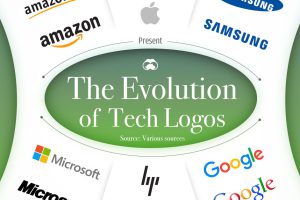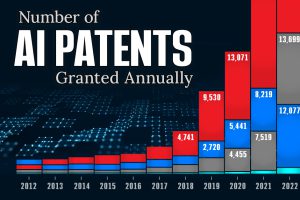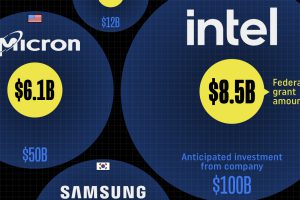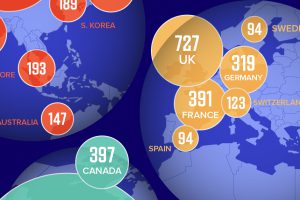They say you shouldn’t believe everything you see on the big screen.
However, in the case of science fiction, the human imagination has gotten a few things right—especially when it comes to futuristic forecasts. Today, the artificial intelligence (AI) revolution is transforming everything, but it turns out we had a hunch about it all along.
When AI Comes to Life
Today’s infographic from Noodle.ai takes a look at how some movie and television predictions for AI’s capabilities have taken hold in the real world.

Many early “predictions” about future technologies certainly missed the mark—but it seems science fiction was able to accurately forecast a thing or two about AI.
AI Basics: Making Life Better
Artificial intelligence is all about equipping machines with the ability to mimic human decision-making processes. It has a wide range of applications, from basic automation to advanced machine learning models.
AI has proliferated into virtually every aspect of life, and in the graphic, it’s clear that several sci-fi-turned-real inventions are aimed at making things more convenient for us humans.
| Sci Fi Prediction | AI in Reality |
|---|---|
| 1962: The Jetsons cartoon shows video calls on a tv screen, and a robot maid. | 2002: iRobot Roomba is the first robotic vacuum. 2018: Facebook Portal is a video-calling smart display. 2019: Moley robotic kitchen is able to prep meals from scratch and clean up afterwards. |
| 1966: Star Trek inspired several tech innovations that have become commonplace. | Examples include: Bluetooth headsets, voice assistants, cellphones, and automatic sliding doors. |
| 1989: Back to the Future features smart glasses for television and phone calls, and a smart watch which can precisely predict weather. | 2012: The Dark Sky app provides custom alerts on the weather to the minute. 2013: Google Glass is able to make calls, send texts, display photos, and provide directions. 2015: Apple Watch comes enabled with WiFi, Bluetooth, a GPS, and even a heart sensor. |
| 1999: Smart House showcases a fully automated house that is able to respond to verbal requests, cook and clean, and control thermostat settings. | 2019: A HGTV contest lets people win a WiFi connected smart house, complete with voice-enabled thermostat and security systems. |
Of course, these have had varying degrees of success. While Google Glass didn’t initially resonate with the wider public, the augmented reality smart glasses have now proved useful in businesses such as manufacturing.
Elsewhere, sci-fi-inspired advances in industries like healthtech are providing a new lease of life for many patients—and continuously reinventing the frontier of what we think is possible.
Sci-Fi Helps Us Push Boundaries
One monumental event in AI history occurred in 1997, when IBM’s Deep Blue beat a chess master at his own game. This event shook the world when we realized what AI could truly be capable of—even though sci-fi had in fact anticipated it 20 years prior.
But as the graphic shows, not all is rosy in science fiction’s likeness of AI. It’s often depicted as something to fear, and certain predictions have proved to be eerily accurate.
| Sci Fi Prediction | AI in Reality |
|---|---|
| 1977: K9, a robotic dog in Doctor Who, beats its master at a chess game. | 1997: IBM’s Deep Blue computer beats a Russian chess master, Garry Kasparov. |
| 1984: Skynet from Terminator, a self-aware AI program, attempts to extinguish humanity. | 2019: The U.S. Army creates an autonomous system to “acquire, identify, and target threats” (ATLAS AI). |
| 2011: AI monitors surveillance cameras and predicts future criminals in Person of Interest. | 2018: The National Data Analytics Solution (NDAS)</em in the UK analyzes police records and assesses the risk of someone committing, or becoming a victim of crime. |
While not all of these are causes for alarm, they clearly demonstrate that sci-fi has the capacity to influence the breakthrough technology we could end up seeing a few years down the line. However, turning reel to real can raise some curious dilemmas.
Rights for Robots?
Last year, the European Parliament debated an interesting question: do robots qualify as people?
The resolution considered granting “personhood” to sophisticated, autonomous robots. However, over 150 AI experts strongly warned against this proposal, arguing it would “blur the relation between man and machine” in a way that is too unethical.
Nevertheless, this thought experiment proves that artificial intelligence is matching our wildest imagined predictions for it.
AI is whatever hasn’t been done yet.
—Tesler’s Theorem
As we move ever closer towards a world where AI is inextricably linked with the everyday, how else could science fiction shape our expectations of the future?





